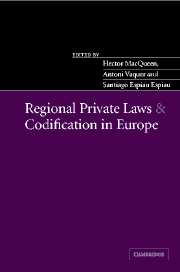Book contents
- Frontmatter
- Contents
- List of contributors
- Acknowledgements
- List of abbreviations
- Introduction
- 1 The civil law in European codes
- 2 ‘A token of independence’: debates on the history and development of Scots law
- 3 The Scottish civil code project
- 4 Scots law in Europe: the case of contract
- 5 Scottish property: a system of Civilian principle. But could it be codified?
- 6 ‘… Quae ad ius Cathalanicum pertinet’: the civil law of Catalonia, ius commune and the legal tradition
- 7 The codification of Catalan civil law
- 8 Unification of the European law of obligations and codification of Catalan civil law
- 9 From revocation to non-opposability: modern developments of the Paulian action
- 10 Epistle to Catalonia: romance and rentabilidad in an anglophone mixed jurisdiction
- 11 Estonia and the new civil law
- 12 The positive experience of the Civil Code of Quebec in the North American common law environment
- 13 From the code civil du bas Canada (1866) to the code civil Quebecois (1991), or from the consolidation to the reform of the law: a reflection for Catalonia
- 14 The evolution of the Greek civil law: from its Roman–Byzantine origins to its contemporary European orientation
- Index
7 - The codification of Catalan civil law
Published online by Cambridge University Press: 30 July 2009
- Frontmatter
- Contents
- List of contributors
- Acknowledgements
- List of abbreviations
- Introduction
- 1 The civil law in European codes
- 2 ‘A token of independence’: debates on the history and development of Scots law
- 3 The Scottish civil code project
- 4 Scots law in Europe: the case of contract
- 5 Scottish property: a system of Civilian principle. But could it be codified?
- 6 ‘… Quae ad ius Cathalanicum pertinet’: the civil law of Catalonia, ius commune and the legal tradition
- 7 The codification of Catalan civil law
- 8 Unification of the European law of obligations and codification of Catalan civil law
- 9 From revocation to non-opposability: modern developments of the Paulian action
- 10 Epistle to Catalonia: romance and rentabilidad in an anglophone mixed jurisdiction
- 11 Estonia and the new civil law
- 12 The positive experience of the Civil Code of Quebec in the North American common law environment
- 13 From the code civil du bas Canada (1866) to the code civil Quebecois (1991), or from the consolidation to the reform of the law: a reflection for Catalonia
- 14 The evolution of the Greek civil law: from its Roman–Byzantine origins to its contemporary European orientation
- Index
Summary
Introduction
To examine the present position of civil law in Catalonia, and to compare it with the position of civil law in nations that show similarities with Catalonia, is a task that we consider to be of importance, in so far as an idea that must inspire – effectively inspire – the action of the government of Catalonia is understanding the civil law of Catalonia both as a feature that shapes the Catalan national identity, and also as a tool of social progress.
With respect to civil law as a feature that shapes our national identity, it should be remembered that, as stated by the Commission concerned with the review of the Compilation, at the beginning of the 1980s, ‘Civil Law represented, together with the language, one of the most important cultural products of the Catalan people, one of the principal exponents of their identity as a people, and therefore one of the essential reference points in identifying Catalonia as a product of a specific historical process’. We cannot – nor do we – view the cultivation and promotion of Catalonia's own legal system and language as an element of confrontation, but as a factor conducive to personal and collective coexistence and enrichment.
As for civil law considered as a tool of social progress, it should be borne in mind that the legal system, which shapes and indeed consolidates social relations, seeks to put forward peaceful and appropriate solutions to the conflicts that arise in every type of community.
- Type
- Chapter
- Information
- Regional Private Laws and Codification in Europe , pp. 164 - 171Publisher: Cambridge University PressPrint publication year: 2003
- 1
- Cited by



